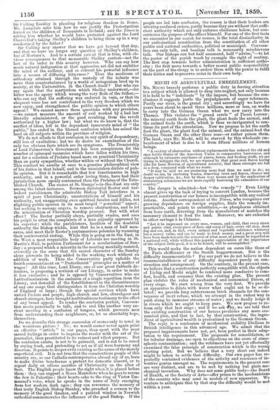MECHI ON AGRICULTURAL EMBEZZLEMENT.
Mn. MECHI bravely performs a public duty, in forcing attention to a subject which is allowed to drop into neglect, not only because it is held to be " indelicate " by the impure, but because the con- clusions it suggests jostle the prejudgments of eager reformers. Purify our river, is the grand cry ; and accordingly we have for years been about to spend three millions, more or less, on works to carry into the German Ocean what we now carry into the Thames. This violates the " grand cercle " of Pierre Leroux : the mineral earth feeds the plant, the plant feeds the animal, and the animal feeds the earth, which is thus re-invigorated to con- tinue its part of the circulation. Now we propose to let the earth feed the plant, the plant feed the animal, and the animal feed the German Ocean and the other three seas—or rather poison them. The land, says Mr. Mechi, will be starved by this wholesale em- bezzlement of what is due to it from fifteen millions of human beings.
"A century of abstraction without replacements has reduced the old and once fertile States of the American Union to comparative barrenness, and although by extensive purchases of guano, bones, and feeding stuffs, we are trying to mitigate the evil, we are warned by that great man Baron Liebig (the Sir Isaac Newton of agricultural science), that these attempts are but as a drop, compared with what we waste. "It may be said we are producing more food than we used to do ; no doubt we are, by enclosing wastes, removing trees and fences, cleaner and deeper cultivation, &c., but by these very means and by the application of stimulating substances we are more rapidly hastening the exhaustion of our country."
The danger is admitted—but " the remedy " ? Even Liebig almost gives up the task of trying to convert London, because the present construction of our houses is incompatible with any radical reform. Another correspondent of the Times, who recognizes our growing dependence on foreign supplies, finds the remedy im- practicable, and points to substitutes,—as phosphorus obtained from bone earth, diverting from the manufacture of matches the necessary element to feed the land. Moreover, we are exhorted to other savings a la Chinoise.
"Let it be impressed on every man, woman, and child, that every straw and potato rind, every piece of horn and scrap of hair, every old shoe, dead dog and cat, and, in fact, every animal and vegetable substance whatever has a money value, and can be made to fetch money, and a great step will have been made towards the removal of what must at present be regarded as a national evil, while without this popular appreciation of the importance of the subject little good, it is to be feared, will be accomplished."
This would make the nation dependent on cares like those of the Paris chiffonier or the Scotch beggarwoman. But is the difficulty insurmountable ? For our part we do not believe in the insurmountableness of any difficulty dependent purely on con- struction and arrangement. On the contrary, in the present case, we believe that a construction perfectly compatible with the objects of Liebig and Mechi might be rendered more conducive to com- fort, health, and economy than the existing plan. The present plan violates the rules of mechanical and economical fitness, at every stage. We start wrong from the very first. We provide an apparatus to dilute with water what ought not to be so di- luted ; we provide long subterranean brick channels for the con- veyance of inert refuse, which we attempt in the rudest way to push along by immense streams of water ; and we finally lodge it in rivers which we ought to keep pure. We now propose to re- form only that last stage ; and if we ask Nthy, we are told that the existing construction of our houses precludes any more eco- nomical plan, and that in fact, by that construction, the ingre- dient of agricultural wealth is predestined to the German Ocean. The reply is a confession of mechanical stolidity libellous to British intelligence in this advanced age. We admit that the proposed improvements have not, yet, been perfect in their adap- tation to the requirement. The proposals for consolidation, or for tubular drainage, are open to objections on the score of atmo- spheric contamination ; and the reformers have not yet effectually examined the false principle of construction which is the wrong starting point. But we believe that a very short cut indeed might be taken to settle that difficulty. Our own paper has re- peatedly contained evidences of the activity and resources of in- ventive genius amongst us. The requirements in the present case are very distinct, and are to be met by nothing but plain me- chanical invention. Why does not some public body—the Board of Health, or the Society of Arts—offer prizes to the mechanicians of the country who may send in models of new apparatus. We venture to anticipate that by that step the difficulty would be met within a year.


































 Previous page
Previous page